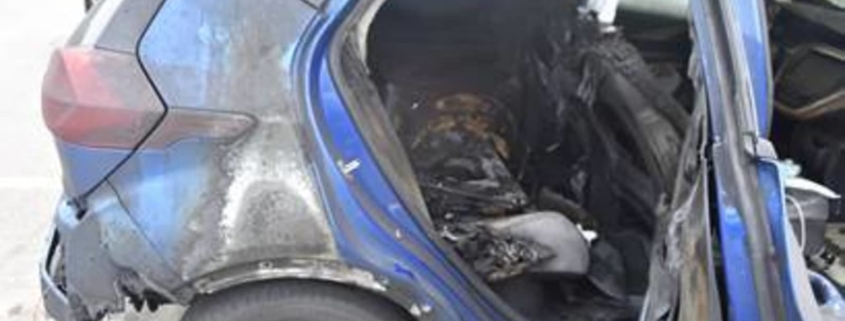Chevy Bolt Fires
General Motors has recalled the Chevrolet Bolt electric vehicles for a second time after two more battery fires erupted in the owner’s cars.
These were vehicles that had allegedly received a fix last November.
Bolt owners are now being warned to park their vehicles outside, limit charging to 90 percent of the battery, and avoid charging them unattended.
The Second Recall
The National Highway Traffic Safety Administration (NHTSA), along with General Motors, has issued the latest consumer warning.
The Chevy Bolt model years 2017, 2018, and part of 2019 is the exact vehicle recalled initially in November 2020 after a fire erupted in the high-voltage battery pack under a backseat cushion. Almost 51,000 vehicles were affected, and owners were warned any fire could spread throughout the car and possibly cause a structure fire.
Two recent fires sparked this second recall in vehicles that had already received the November fix.
In early July, one of the Chevy Bolt electric vehicles that caught fire belonged to state Rep. Timothy Briglin from Vermont. The vehicle’s interior and some of the exterior were burned in the chemical fire as the battery cells can smoke and ignite internally. In this case, the electrical fire started within the area of the back seat. It is a similar fire to other Bolt EV fires reported to federal regulators.
Briglin had serviced the vehicle during the first recall, an indication the fix didn’t work. The fear is the combustion can cause a structure fire if the car is parked inside. The other fire occurred in a Chevy Bolt in New Jersey.
In total, there have been nine battery-related fires in GM Bolts in the U.S., according to General Motors.
The first recall for Bolt involved diagnostic software monitoring for the defect and alerting the owners.
With this second recall, GM says it will replace the defective lithium-ion battery modules made by LG Chem. Both companies discovered a “rare manufacturing defect” in some battery modules that had the potential to cause a short and spark a battery fire.
The fix will be free to owners. It affects all BOLT 2017-2019 vehicles, whether or not they received the current software update. Consumers are encouraged to bring their vehicles to the nearest Chevrolet electric vehicle (EV) dealer to obtain the software update, the subject of the first recall.
An estimated 69,000 vehicles are affected globally. GM says it will notify customers when the replacement parts are ready.
GM Recommends
In the meantime, the automakers issued recommendations to Bolt owners.
- Owners should park their electric vehicles away from their homes due to the fire risk. NHTSA also warned against leaving a vehicle charging overnight.
- Chevrolet urges Bolt owners to use Hilltop Reserve mode or Target Charge Level to keep the charge under 90 percent. It is recommended you recharge the vehicle after a trip, although owners should not charge their vehicles overnight. Instead, after a charge, unplug the car and park it outside overnight. Leave at least 70 miles in the battery.
- Bolt owners should visit NHTSA.gov/recalls. Enter your 17-digit vehicle identification number to determine if your vehicle is recalled. Call the closest dealership to schedule a free repair. Consumers can also visit www.chevy.com/boltevrecall or call the helpline at 1-833-EVCHEVY.
If there are additional fires, GM could buy back some of the vehicles to avoid litigation and triggering of state lemon laws.
The Future of EV
Expect a wave of electric vehicles to hit the market soon. Environmentally, an EV lessens our dependence on oil, thereby benefitting the environment. However, the problems linked to lithium-ion batteries and chemical fires remain unresolved.
The infrastructure bill, once it passes, will mark the most significant investment in transit in the history of the country as well as an investment in climate change.
Part of the infrastructure bill will include federal electric vehicles and 500,000 charging stations placed in communities and rural areas. The changes include electric transit busses and school busses resulting in cleaner air.
Tesla has reported the greatest number of fires related to the lithium-ion battery. In one case, a Tesla Model S Plaid reportedly caught fire in Pennsylvania with the driver behind the wheel. The locks malfunctioned, and the driver couldn’t escape the burning vehicle.
That particular Tesla had not been involved in a previous crash, as can happen after an accident when the lithium-ion battery is punctured.
It’s still uncertain whether there are more reports of fires with EVs simply because there are more on the road or if there is a greater risk of fire with EVs than with cars with internal combustion engines.
Also on the drawing board are lithium metal batteries which are beginning to show promise for commercial application. Its anode is made of pure lithium, which increases energy density and charges much faster. The cathode is positively charged with the electrolyte in the middle. The challenge is to find a stable electrolyte for the new battery. Flammability tests of a novel fluoride electrolyte indicate its less likely to catch fire.
Competitors are joining the estimated $70 billion battery arena, searching for a longer-lasting and safer battery for the upcoming fleet of electric vehicles poised to overtake combustion engines in the U.S.
Sources:
Chevrolet https://my.chevrolet.com/how-to-support/safety/boltevrecall
NHTSA https://www.nhtsa.gov/press-releases/consumer-alert-important-chevrolet-bolt-recall-fire-risk
CNBC https://www.nhtsa.gov/press-releases/consumer-alert-important-chevrolet-bolt-recall-fire-risk
https://www.cnbc.com/2021/07/07/the-chevy-bolt-ev-belonging-to-vermont-lawmaker-who-backed-industry-catches-fire.html
Washington Post https://www.washingtonpost.com/business/gm-issues-2nd-bolt-recall-faulty-batteries-can-cause-fires/2021/07/23/ef6f4694-ebb5-11eb-a2ba-3be31d349258_story.html
Energy Post.eu https://energypost.eu/new-lithium-metal-battery-electrolyte-can-lengthen-range-of-evs/
Springer https://link.springer.com/article/10.1007/s10694-019-00944-3




Leave a Reply
Want to join the discussion?Feel free to contribute!